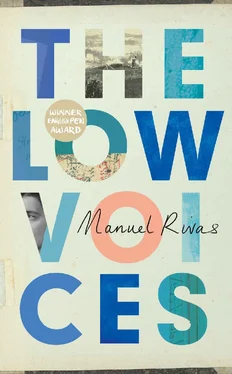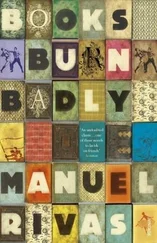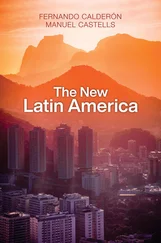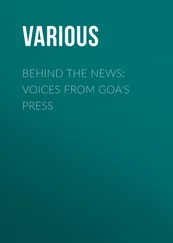Manuel Rivas - The Low Voices
Здесь есть возможность читать онлайн «Manuel Rivas - The Low Voices» весь текст электронной книги совершенно бесплатно (целиком полную версию без сокращений). В некоторых случаях можно слушать аудио, скачать через торрент в формате fb2 и присутствует краткое содержание. Год выпуска: 2016, Издательство: Harvill Secker, Жанр: Современная проза, на английском языке. Описание произведения, (предисловие) а так же отзывы посетителей доступны на портале библиотеки ЛибКат.
- Название:The Low Voices
- Автор:
- Издательство:Harvill Secker
- Жанр:
- Год:2016
- ISBN:нет данных
- Рейтинг книги:5 / 5. Голосов: 1
-
Избранное:Добавить в избранное
- Отзывы:
-
Ваша оценка:
- 100
- 1
- 2
- 3
- 4
- 5
The Low Voices: краткое содержание, описание и аннотация
Предлагаем к чтению аннотацию, описание, краткое содержание или предисловие (зависит от того, что написал сам автор книги «The Low Voices»). Если вы не нашли необходимую информацию о книге — напишите в комментариях, мы постараемся отыскать её.
A brilliant coming-of-age novel from one of Spain’s greatest storytellers,
is a humorous and philosophical take on memory, belonging, and the nature of storytelling itself.
The Low Voices — читать онлайн бесплатно полную книгу (весь текст) целиком
Ниже представлен текст книги, разбитый по страницам. Система сохранения места последней прочитанной страницы, позволяет с удобством читать онлайн бесплатно книгу «The Low Voices», без необходимости каждый раз заново искать на чём Вы остановились. Поставьте закладку, и сможете в любой момент перейти на страницу, на которой закончили чтение.
Интервал:
Закладка:
María Rivas
We coincided for a time in Santiago. I was studying and working in Madrid, but returned to Galicia to join the team of the weekly magazine Teima , the first to be published in Galician after the Second Republic. It was a time of great upheaval, great disappointments and hopes, during which the regime endeavoured to outlive the dictator, and the ground of history seemed as fragile as a thin layer of ice. Some say it was a failure, that weekly magazine, together with others like it that sprouted up all over Spain. What strikes me as miraculous is that the spring for us should last a whole year. Carrying out reports, in a single day, you underwent the sensation in one place of being received as a saviour of words and in another, not far away, of enduring the gears of silence-piercing hatred. María went with me to some of the more risky locations. She was there on the day of As Encrobas, 15 February 1977, when dozens of guards surrounded the area in order to expropriate lands that were earmarked for mining. Peasant women on the front line, resisting rifle blows with their umbrellas. All day, until sunset. María couldn’t bear it. She didn’t want to be a witness only. She forgot all about me. She went over to the women to attend to their wounds. On her knees, in the mud, covered in dirt and blood. The guards, panting heavily, furious about the outcome, some uneasy, passed in front of the kneeling girl, her bright white skin smeared with dirt, as if they couldn’t see her. At nightfall, she got up and returned without a word to where the photographer and I were standing.
Chagall talked about the coloured horses Russian workers and peasants painted at his art school to adorn the streets during the first May Day parade to be celebrated after the revolution. After that, there weren’t any more horses, only official portraits. Our coloured horses were those experiences of indomitable journalism in the Spain of the transition, rebelling against the fatality of things being ‘tied and well tied’. We would end up enduring the grey ‘restoration’.
For a time, María and I shared an old apartment in Algalia, a district of Santiago. It had dripping water in every room (the Weatherman’s stick again!) and the odd mystery. One day, we heard whispers in the attic. There was a door that was always closed. Until we decided to open it any way we could. There was a little man, a simpleton, who had been locked away. He spent the days eating sunflower seeds. The whole floor was covered in husks. He didn’t speak. He only expressed himself with onomatopoeias. He didn’t move. The look of surprise when he saw an unknown girl and boy opening the door. He traced a smile. The smile of pain. He had a nice face that made him look younger than he really was. We spoke to the landlady. She said we weren’t to give it any importance. He was timid enough. Yes, but what was he doing locked up in the attic? The following day, when we woke up, he wasn’t there anymore. There were traces of sunflower seeds on the stairs.
María was the only one in our family to know that I had been arrested in Madrid. A concealment to prevent family concern. I had arrived in September 1974. I would turn seventeen in October. It was more or less around my birthday. At a demonstration, at nightfall, on Princesa Street. The police had been tipped off. Our initial shouts were a signal for them to charge. They emerged from every direction. A real ambush. A group of demonstrators ran up a dead-end street like lambs following the orders of the boldest among us, who bore a certain resemblance to the poet Leopoldo María Panero. A comic episode, had we not ended up in the most feared building in Madrid at that time — the national police headquarters on the Puerta del Sol. There were so many of us in the dead-end street they took us there by bus. Most of us were detained for two days in cells packed with people, after we had identified ourselves, stripped down and had our photographs taken. Five people had been squeezed into my cell, but nobody felt much like talking. I was led upstairs to an office to be questioned. It wasn’t a historic moment. Of the two officers present, one didn’t even look at me, taken up as he was with intellectual labours. The other asked me to identify myself again. ‘So you’re Galician? Your accent gives you away.’ As always when it came to the question of phonetics, I was reminded of César Vallejo — ‘The accent dangles from my shoe’ — but this time I didn’t want to bring poems into it.
‘Yes.’
‘And are you on the other side? Against Franco?’
‘Yes.’
He gave me a very professional slap across the face and reminded me that Franco was also Galician.
‘So you’re the one who’s stupid.’
I didn’t reply to this. I was struggling to establish a connection between my accent and being opposed to Franco or not. I felt uneasy that the other policeman, the intellectual, might include the term ‘nitwit’ in my record to describe my affiliation. In my nightmare, I was hopeful he would at least write ‘useful nitwit’. That was about it. They had too much work that day to be wasting their time with a snotty student. One of my cellmates, a young worker, came back from questioning with a broken nail and a bloody hand. Not a word of complaint. He didn’t even allow them a gesture of pain. He deserved the company of someone like Max Estrella in Bohemian Lights , but we all stayed quiet, perhaps in the absurd hope that the murmurs and footsteps coming from the pavements of the Puerta del Sol were the echoes of liberating hordes. Nothing. All the echoes vanished into the night. I didn’t feel like a fighter. I was — we were — humiliated people. The following day, a man turned up with a bucket of lentils. He gave us each a zinc bowl and poured in a spoonful of slops. From time to time, he would say, ‘Shit!’ And let out a laugh.
Boh.
When they hurt, María and I would share our secrets.
Her skin was very white and had freckles the colour of maize bread. I liked her way of being. Her body as well. Her virtually transparent skin. The hydrography of her veins. Her cereal freckles. One day, in Algalia, we embraced as a result of the groundswells. She was crying because of a lost love. I was down in the dumps because of some other disenchantment. We fell asleep in that bed so well suited to shipwrecks: surrounded by buckets and bowls to collect the dripping water.
But this time it didn’t knock.
The news of her illness arrived when I was in Ireland with Isabel and the children. Isabel was one of the five girls who lived above the bar Dos Ciudades. We were now staying north of the Liffey river, in Temple Villas, right next to the prison on Arbour Hill, which helped keep the rent down. We felt comfortable, at ease, in that Dublin where on a Saturday, near the house, in Smithfield, there would be a horse and potato market. Nobody had come up with the term ‘Celtic Tiger’ yet. In some pubs, they still remembered O’Brien, the man who always kept his right hand in a glove because he’d promised his mother, on her deathbed, that he would never touch a glass of alcohol again. The women selling products in large prams on Moore Street would say to whoever fondled the tomatoes, ‘They’re not pricks, love! The more you squeeze them, the softer they get.’
It was my sister Chavela who called. There were no mobiles, but the ring of the landline was clear enough. Now I knew why my father never lifted the receiver. He could scent the approach of destiny. María was sick. How sick? Very sick. They’re going to operate on her, but it would seem she has metastasis. She did. It was already too late. One day, I went with her to Santiago. She wanted to speak to the doctor who had operated on her the first time. There was no hope, either in the words or in the eyes or in the gestures of this man. I looked around his consultation room. The walls were bare. Cast in shadow. The doctor spoke with half his face lit up by a desk lamp.
Читать дальшеИнтервал:
Закладка:
Похожие книги на «The Low Voices»
Представляем Вашему вниманию похожие книги на «The Low Voices» списком для выбора. Мы отобрали схожую по названию и смыслу литературу в надежде предоставить читателям больше вариантов отыскать новые, интересные, ещё непрочитанные произведения.
Обсуждение, отзывы о книге «The Low Voices» и просто собственные мнения читателей. Оставьте ваши комментарии, напишите, что Вы думаете о произведении, его смысле или главных героях. Укажите что конкретно понравилось, а что нет, и почему Вы так считаете.












